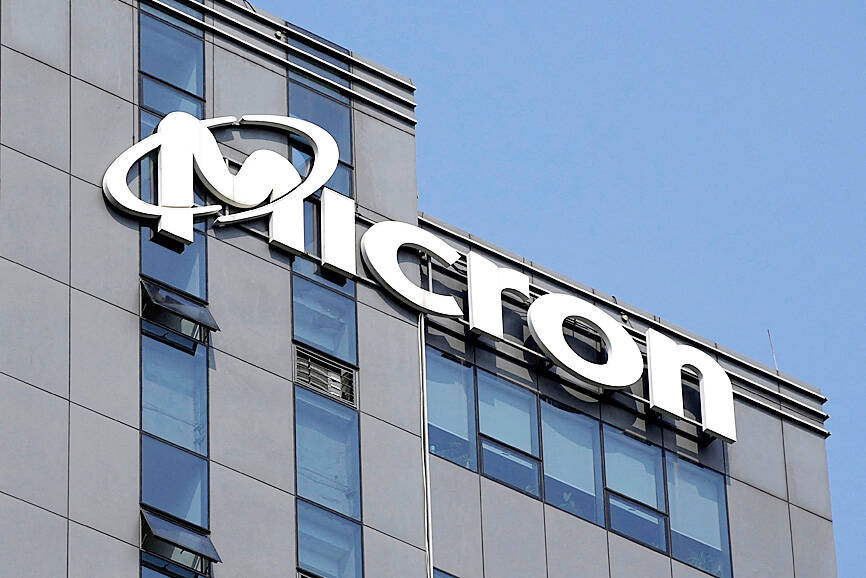Micron Technology Inc, the largest US memorychip maker, on Wednesday offered a surprisingly strong revenue forecast for the current quarter, buoyed by demand for artificial intelligence (AI) hardware.
Fiscal third-quarter revenue would be US$6.4 billion to US$6.8 billion, the company said in a statement. That compares with an average analyst estimate of US$5.99 billion.
Micron would have earnings per share of about US$0.45, minus certain items. Analysts projected US$0.24.

Photo: Reuters
Micron and its rivals are emerging from one of the worst slumps the memorychip industry has suffered, triggered by weak demand for PCs and smartphones, but executives are optimistic about the future as the booming market for AI equipment helps chipmakers return to growth and profitability.
“We believe Micron is one of the biggest beneficiaries in the semiconductor industry of the multi-year opportunity enabled by AI,” Micron chief executive officer Sanjay Mehrotra said in the statement.
Mehrotra has promised investors that this year would mark a rebound for the industry and next year would see record sales levels, but Micron would need to make enough ultrafast memory, which works with Nvidia Corp chips to help data center operators develop AI software.
AI-related systems use high-bandwidth memory (HBM). That type of chip is new and less of a commodity. That means Micron can charge a much higher price.
Micron got its first revenue from a form of this memory known as HBM3E in its most recent quarter. The semiconductors are part of Nvidia graphics chip-based AI accelerators, the company said.
The company expects “several hundred million” dollars of revenue from HBM products this year. The majority of its production of such chips is sold out for next year, it said.
Nvidia chief executive officer Jensen Huang (黃仁勳) on Monday said that HBM was more than just a memory upgrade — it is a technical marvel that is vital to AI systems. He mentioned Micron as a leader in bringing the new technology to market.
In the second quarter, which ended on Feb. 29, Micron’s revenue rose 58 percent to US$5.82 billion. The Boise, Idaho-based firm had earnings per share of US$0.42, excluding certain items. That compares with estimated sales of US$5.35 billion and a projected loss per share of US$0.24.
“Micron has returned to profitability and delivered positive operating margin a quarter ahead of expectation,” Mehrotra said on a conference call with analysts.
The company said it is maintaining its budget for new plants and equipment for this year at US$7.5 billion to US$8 billion.
It is to proceed with projects in China, Japan and India, while proposed US expansions “require Micron to receive the combination of sufficient CHIPS and Science Act grants, investment tax credits and local incentives to address the cost difference” compared with overseas expansion, Mehrotra said.

DIVIDED VIEWS: Although the Fed agreed on holding rates steady, some officials see no rate cuts for this year, while 10 policymakers foresee two or more cuts There are a lot of unknowns about the outlook for the economy and interest rates, but US Federal Reserve Chair Jerome Powell signaled at least one thing seems certain: Higher prices are coming. Fed policymakers voted unanimously to hold interest rates steady at a range of 4.25 percent to 4.50 percent for a fourth straight meeting on Wednesday, as they await clarity on whether tariffs would leave a one-time or more lasting mark on inflation. Powell said it is still unclear how much of the bill would fall on the shoulders of consumers, but he expects to learn more about tariffs

Meta Platforms Inc offered US$100 million bonuses to OpenAI employees in an unsuccessful bid to poach the ChatGPT maker’s talent and strengthen its own generative artificial intelligence (AI) teams, OpenAI CEO Sam Altman has said. Facebook’s parent company — a competitor of OpenAI — also offered “giant” annual salaries exceeding US$100 million to OpenAI staffers, Altman said in an interview on the Uncapped with Jack Altman podcast released on Tuesday. “It is crazy,” Sam Altman told his brother Jack in the interview. “I’m really happy that at least so far none of our best people have decided to take them

PLANS: MSI is also planning to upgrade its service center in the Netherlands Micro-Star International Co (MSI, 微星) yesterday said it plans to set up a server assembly line at its Poland service center this year at the earliest. The computer and peripherals manufacturer expects that the new server assembly line would shorten transportation times in shipments to European countries, a company spokesperson told the Taipei Times by telephone. MSI manufactures motherboards, graphics cards, notebook computers, servers, optical storage devices and communication devices. The company operates plants in Taiwan and China, and runs a global network of service centers. The company is also considering upgrading its service center in the Netherlands into a

NOT JUSTIFIED: The bank’s governor said there would only be a rate cut if inflation falls below 1.5% and economic conditions deteriorate, which have not been detected The central bank yesterday kept its key interest rates unchanged for a fifth consecutive quarter, aligning with market expectations, while slightly lowering its inflation outlook amid signs of cooling price pressures. The move came after the US Federal Reserve held rates steady overnight, despite pressure from US President Donald Trump to cut borrowing costs. Central bank board members unanimously voted to maintain the discount rate at 2 percent, the secured loan rate at 2.375 percent and the overnight lending rate at 4.25 percent. “We consider the policy decision appropriate, although it suggests tightening leaning after factoring in slackening inflation and stable GDP growth,”